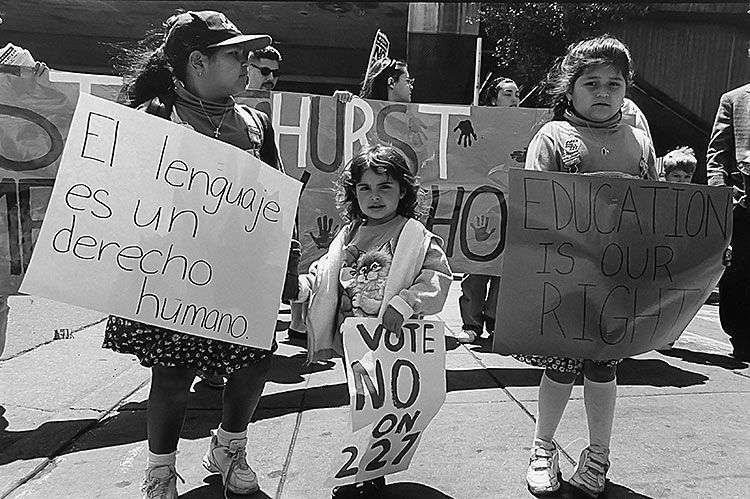“A nationally designated language is at the core of a unified and cohesive society, and the United States is strengthened by a citizenry that can freely exchange ideas in one shared language.”
—Executive Order 14224, Designating English as the Official Language of the United States, March 1, 2025
Signed on March 1, 2025, Executive Order 14224 rests on the seemingly anodyne claim that a nationally designated language fosters unity and cohesion. But this premise is not just misguided—it’s sonically violent. Whether framed as patriotic or as a simple matter of efficiency, this rhetoric is about controlling which voices are heard and which are erased. In the U.S., where language is deeply racialized, dominant norms don’t just privilege English; they mark entire communities as deficient for speaking differently. Linguistic difference becomes deviance, and fluency in standardized English is framed as the price of inclusion.
Declaring English the sole official language is not about unity. It is about auditioning for belonging—with whiteness as the judge. It’s about sound, power, and the normalization of exclusion. It tells us who gets to be heard and who is dismissed as noise. As sound theorist Ana María Ochoa Gautier (2014) demonstrates, listening practices are never neutral: they determine who can be known, who can be recognized, and whose voice counts as legitimate within the nation-state. What we hear—and what we’re trained not to—shapes who belongs.

The English-only movement has a long history in California and the US generally. In this 1998 photo, children and their parents demonstrate against English-only Proposition 227 in Oakland. Photo Credit: David Bacon
The Trump administration’s executive order declaring English the United States’s official language doesn’t just shift policy. It elevates one sound, one way of speaking, as the standard for national identity. But language is never neutral. Our accents, our dialects, are always entangled with power. In the wrong hands, sound becomes a tool of exclusion. So we have to ask: When the state tells us what belongs, what does hate hear? Hate isn’t just an emotion—it’s a system that hears difference as danger. It listens for accents, for slips, for signs of not belonging. In this way, an accent heard by ears trained to reject it becomes a kind of dog whistle, a warning that an interloper is near. The audible traces of the languages that shaped certain voices are heard as threats by the hater and thus become a source of fear for the hated. And what kind of violence grows, then,not from words but from the way they sound?
English is now the authorized frequency. Everything else—Spanish, Chinese, Tagalog, Vietnamese, Arabic, German, and beyond—is marked for silencing. But language doesn’t vanish because a president says so. You can ban it from ballots, classrooms, courtrooms, but it won’t disappear—it survives, it echoes. It clings to daily life: a child translating in and out of Mandarin at the DMV, a whispered prayer in Arabic, Spanish shouted across a job site, a teacher describing the Tovaangar, the world, in a language that, we’ve been told, has gone “extinct.” What unsettles the state isn’t the sound itself—it’s the refusal to be silent.
Under such policies, other languages become suspect. An accented voice becomes a red flag. A non-English voice becomes evidence of un-belonging. According to the state, these aren’t sounds—they’re warnings. Hence this order doesn’t just promote English. It authorizes exclusion. It tells us that difference is a threat. And that’s how hate thrives—not only in shouts, but in structure. Not only in slurs themselves, but in the state’s blessing of their sounding—sharp and unchecked.
Psychologists Agneta Fischer and Eran Halperin (2018) argue that hate is enduring and accumulative, being continuously grounded in the belief that the hated group is fundamentally immoral. It thrives on repetition—narratives, images, sounds—and is often built into our social infrastructure. Halperin notes that hate often stems from a sense of powerlessness and seeks elimination. So, when the state elevates one language above all others, it doesn’t just reorganize bureaucracy—it lets ambient violence settle into the everyday, teaching us to flinch at differences (310).
Consider the norteño band Los Tigres del Norte, often called la voz del pueblo—the people’s voice. Now naturalized American citizens, they began recording in the 1960s as teenage immigrants in San Jose, California.From the start, they sang entirely in Spanish. They still do. Through canciones norteñas and corridos, they’ve chronicled working-class, immigrant, and undocumented life for decades. Their hit “La Jaula de Oro” (“The Golden Cage”) captures the paradox of being present in America but culturally confined: “¿De qué me sirve el dinero / si estoy como prisionero…?”—“What use is money, if I live like a prisoner?” The sadness is not resignation—it’s sonic truth: I’m here, but I’m not heard.

Los Tigres del Norte at the Chumash Casino Resort in Santa Ynez, California. Photo Credit: Dwight McCann
In 2018, on the 50th anniversary of Johnny Cash’s Live at Folsom Prison (2019), Los Tigres—not a country artist—who performed inside Folsom, producing a Netflix documentary. Their concert, sung entirely in Spanish, drew from norteño traditions and Chicano, Mexican-American, and migrant experiences. Like Cash, they gave voice to the marginalized, the incarcerated, the working class—but from a position long ignored: not just singing about America, but as America. That they did so in Spanish only deepened the truth—this is what America sounds like.
Spanish, central to American community life, has long existed alongside the false demand that to be American, you must abandon it at the border. But our vibrant, enduring, and continually flourishing Hispanic communities show otherwise. Executive Order 14224 sharpens this contradiction—treating as disruption what has always been essential. Sonic citizenship isn’t just about what’s spoken—it’s about who has the right to vocalize their identity without fear. Citizenship has always been more than legal status; it’s about belonging, about recognition. Sonic citizenship asks: who is allowed to be heard, to speak in their own language, their own accent, without threat or silence imposed? It’s about the freedom to exist audibly, without having to translate yourself into dominance just to survive. What’s at stake isn’t just communication—it’s permission to belong, to be heard without fear.
The questions are no longer rhetorical:
What languages have we surrendered or allowed to be taken in silence? Whose voices have we been trained not to hear? And if we keep tuning them out, what forms of hate are we letting fester quietly, until they erupt?
Tired of our contradictions, the world is already turning away from the United States. And if we, too, turn away from the voices in our streets, courtrooms, and songs–if we choose not to hear difference–then hate becomes the only thing that resounds: Loud, sanctioned, and echoing through a frequency of our own making.
EO 14224 may claim to make English the official language, but what it really does is legislate sound. It creates a hierarchy, telling us not just what to speak, but what to hear—and what to fear. We can learn from Los Tigres del Norte’s defiance. Language is survival, and to speak in a language marked for erasure is to resist disappearance. Declaring English the sole language isn’t just policy—it’s sanitization. It flattens the polyphony of American life, casting other voices as foreign, disruptive, un-American.
Hate doesn’t always come with slurs. Sometimes it speaks in policy—measured, calm, cloaked in the language of unity. It narrows who can speak, and what can be safely heard. But we can listen differently. We can reject the lie of one language as the cost of belonging, and embrace the layered, dissonant voices that shape us. If the state tells us what to fear through sound, we can answer by refusing to unhear each other.
To learn more about Kathryn Agnes Huether’s work, visit her website here.
References
Arnesen, Eric. 2001. “Whiteness and the Historians’ Imagination.” International Labor and Working-Class History 60 (October): 3–32. https://doi.org/10.1017/s0147547901004380.
Contreras, Felix. 2019. “Los Tigres Del Norte Retrace Johnny Cash’s Steps in ‘Folsom Prison’ Documentary.” NPR, October 18, 2019. https://www.npr.org/sections/altlatino/2019/10/18/771255113/los-tigres-del-norte-retrace-johnny-cashs-steps-in-folsom-prison-documentary.
Donahue, Tom, dir. 2019. Los Tigres Del Norte at Folsom Prison. Netflix.
Gautier, Ana María Ochoa. 2014. Aurality: Listening and Knowledge in Nineteenth Century Colombia. Duke University Press.
Fischer, Agneta, and Eran Halperin. 2018. “Why We Hate.” Emotion Review 10 (4): 309-320. https://doi.org/10.1177/1754073917751229.
Trump, Donald J. 2025. Designating English as the Official Language of the United States. Executive Order 14224. 90 Fed. Reg. 11363 (March 6, 2025). https://www.federalregister.gov/documents/2025/03/06/2025-03694/designating-english-as-the-official-language-of-the-united-states.
